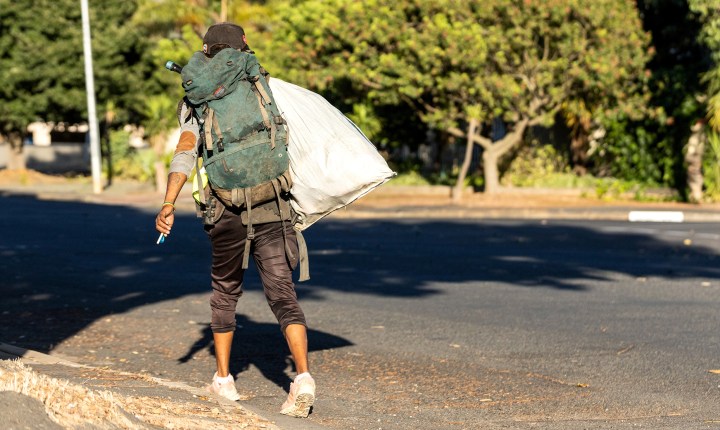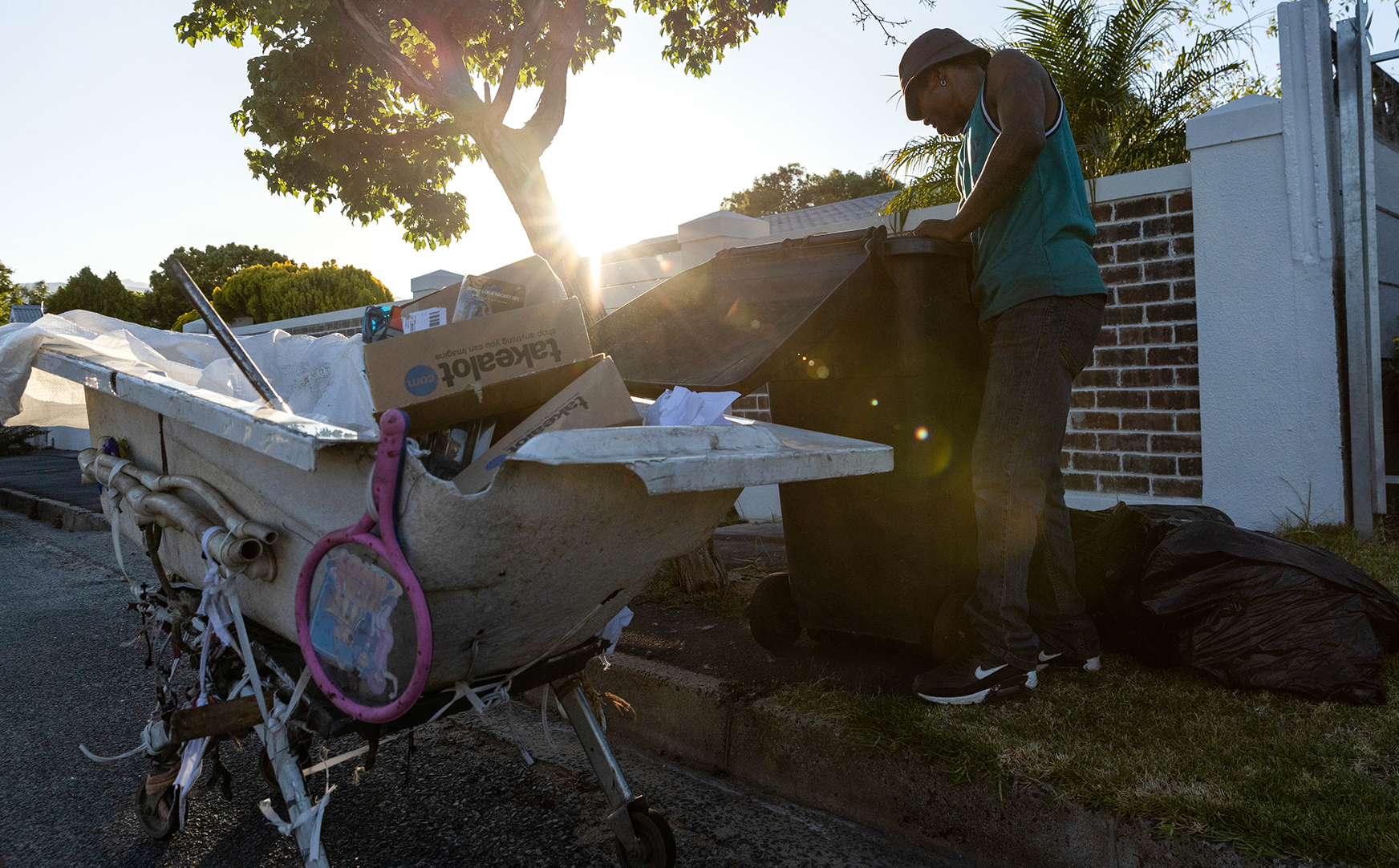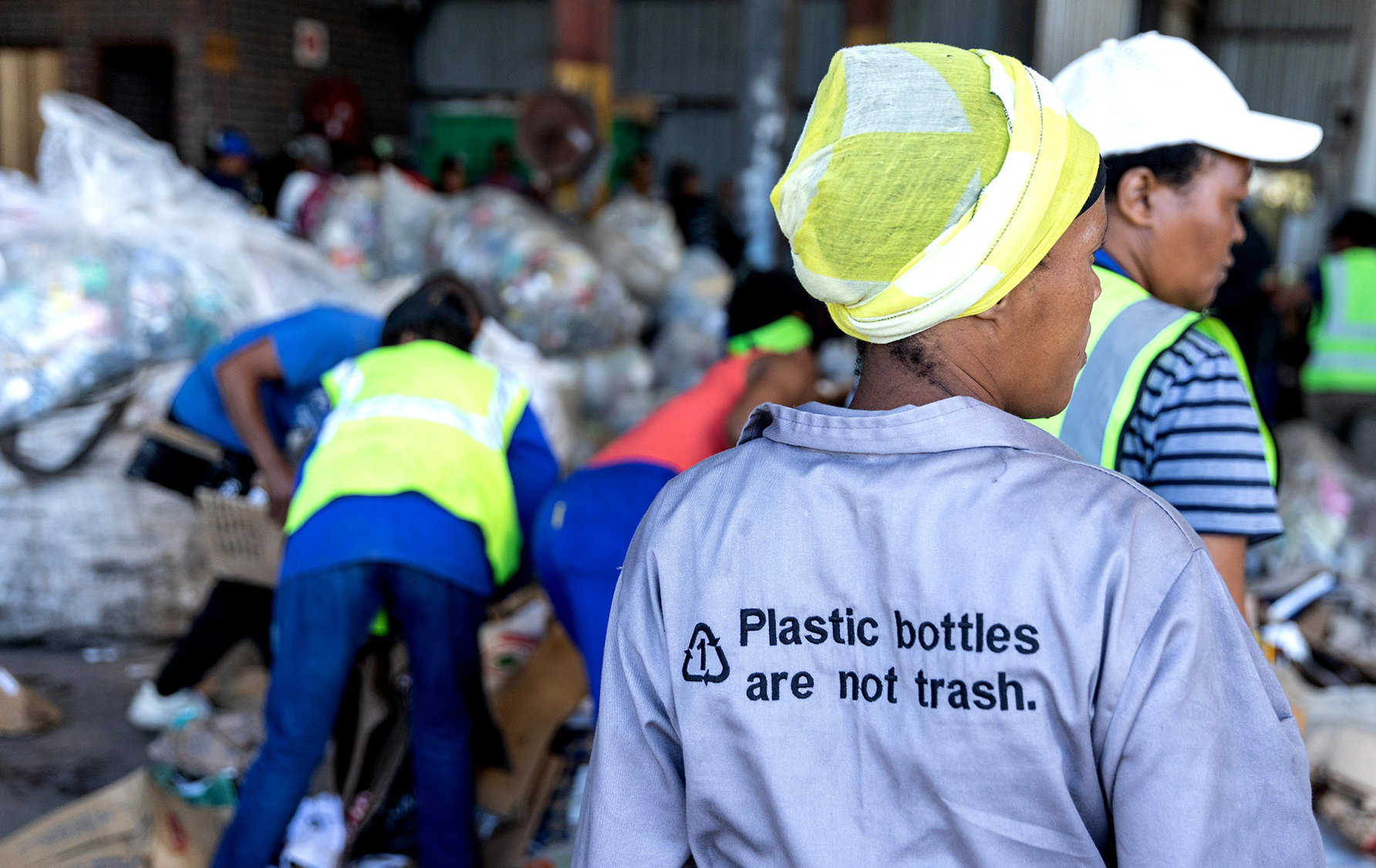RETHINKING RECYCLING
Economic recovery starts on our streets – a story about waste

Efforts by the Drakenstein Municipality show how waste reclaimers could help to make the process of waste management more visible, educate people, and help mend the social fabric torn apart by apartheid.
At 6am on a Thursday in Paarl, as residents start putting their bins out on the street, we meet Francois September who lives nearby “under a bridge”. He allows us to join him as he works. First, he tackles individual bins, then those belonging to a block of flats. After working for a few hours, he crosses the bridge to sort out his goods at a clearing spot before taking them to one of the buy-back centres in the nearby industrial area, Drommedaris.
September illustrates how, under very dire conditions, waste reclaimers have created an ecosystem that works. Economic recovery should focus on supporting those already doing valuable work, not just on big, shiny new projects. Waste reclaimers are often silent change-agents creating not only economic activity but also tackling environmental and social justice issues. Yet they are invisible because, as with waste, we prefer not to look.
The Drakenstein Municipality in the Western Cape has been hailed for its efforts to integrate waste reclaimers into its formal waste management system. The national government adopted plans for waste-reclaimer integration in 2020, and clear guidelines have been developed, yet very few municipalities have put systems in place.
In 2018, the municipality started the process of integrating waste reclaimers operating at the Wellington landfill, which receives most of the municipality’s waste. This entailed a long engagement process and the establishment of a materials recovery facility in Paarl to enable waste reclaimers – known as “wastepreneurs” – to sort and separate their waste and run their business. Despite only allowing 30 waste reclaimers at a time, the Paarl facility is a vibrant space.

Francois September makes on average R50 per day by collecting recyclables outside homes in Bloemandale, Paarl. (Photo: Ashraf Hendricks)
The municipal pilot focused on street waste reclaimers started in 2022. It aims to help regulate street waste collection in certain parts of Drakenstein. It will entail registering waste pickers on a database and providing them with recognisable IDs and personal protective equipment. According to municipality officials, this will ensure that the system is orderly, safe and transparent. According to Thys Serfontein, senior manager, solid waste and landfill management, “the programme seeks to assist those reclaimers genuinely doing the work, to have a dignified life. It will also prevent criminal elements or people abusing the system.”
Tailored entrepreneurship support
The potential that waste holds for job generation is uncontested, and private firms are already creating significant revenue. However, waste reclaimers are doing the lion’s share of work on the streets and in landfills yet don’t always get a fair share of the profits. They also bear the brunt of people’s unhealthy relationship with waste which marginalises them due to misconceived fears and a lack of information.
Read in Daily Maverick: “Waste pickers need formal recognition, and full and fair remuneration for their services”
Despite those challenges, the integration efforts in Drakenstein have seen concrete progress. Community leader Solly Peters, one of the coordinators at the Paarl materials recovery facility, says that waste reclaimers at the Wellington landfill went from earning a weekly average of R150 to as much as R1,200. Providing space and equipment within an enabling environment has encouraged waste reclaimers to organise and connect with supporting programmes.

Rian Gedalt designed his own waste transport by attaching wheels to a bathtub. (Photo: Ashraf Hendricks)
While more space and equipment are useful, Dr Adeel Sambo, a lecturer at the Cape Peninsula University of Technology, explains that developmental mentoring is essential for a genuinely sustainable process. As Peters points out, most waste reclaimers come from difficult backgrounds, including broken homes and prisons. He says the work needs to start with basic social skills, and gradually provide the business, social and technical skills that can help entrepreneurship to thrive.
Environmentally sound, but socially challenging
Back at the Paarl materials recovery facility, Zane Sias, principal engineering technician at the Drakenstein Municipality, guides us around the facility and introduces us to waste reclaimers who used to work at the Wellington landfill. Waste reclaimers, he says, are affected by a central paradox: “People who say they value the word ‘recycling’ often disregard the value of the people doing the sorting, recycling and taking it to the market.”
Read in Daily Maverick: “First global waste pickers’ trade union launched”
Informal conversations with Bloemendal residents confirm this notion. Teuns, one of the neighbours, expressed sympathy for the “tough conditions” but said his main concern was their aggressive and sometimes reckless “behaviour”. Nobody we spoke to knew about the integration scheme, but at least one woman said she liked the idea of supporting waste reclaimers.
Visit Daily Maverick’s home page for more news, analysis and investigations
According to Catherina Schenck, DSI/NRF/CSIR chair in waste and society and professor at the University of the Western Cape, one of the biggest challenges is space for sorting out waste. This is where many residents’ resistance often comes from, she says, as they don’t want to see what is left behind in front of their home. The Paarl materials recovery facility provides that space but not every waste reclaimer can or will go to the site to sort before taking things to the buy-back centres. Schenck suggests less-centralised spaces and options to sort at buy-back centres, which may require rezoning by municipalities.

Waste pickers or ‘wastepreneurs’ play a crucial role in safeguarding our environment by reducing the waste that ends up at landfills. (Photo: Ashraf Hendricks)

At the Paarl materials recovery facility, a team of 25 waste pickers works to separate and collate recycling material. (Photo: Ashraf Hendricks)
The logistics are clearly not easy but there is enough technical knowledge and commitment across sectors to figure it out. The bigger challenge is to generate trust among residents and leaders alike.
Saliem Haider, director of waste management in the Western Cape government, explains that some municipalities are very reluctant when it comes to waste picker integration. Waste is often a politically sensitive topic and councillors are hesitant to commit on issues where there are opposing sentiments in communities. The result is tacit support for “formalised” programmes in which privatised companies benefit at the expense of waste reclaimers, while areas remain unserved and waste continues to end up in landfills since only a minority of residents recycle. Municipalities also tend to favour the Extended Public Works Programme, which is subsidised and not the correct vehicle for the integration of waste reclaimers, asserts Haider.
Embracing the learning nature of waste collection
The street waste reclaimer integration pilot is interesting as an environmental, economic and social initiative, yet as with any social experiment, it is likely to require many iterations. The Drakenstein Municipality is optimistic but is also aware that the learning process will not end with the pilot.
Read in Daily Maverick: “Letter from Gauteng: The waste picker of 30th Avenue, Pretoria”
Sambo points to challenges the pilot is likely to face which are intrinsic to the people involved. Waste reclaimers often sell the protective equipment they receive, he says, because there is more immediate value in it. There are also people who are either unable to register or simply choose not to, which must be respected – people can’t be denied work because they haven’t joined the formal system.

The Paarl materials recovery facility has a designated area for material to be organised in bales which are taken to buy-back centres. (Photo: Ashraf Hendricks)

Solly Peters is a community leader who started working at Wellington landfill and supported efforts by the municipality to integrate waste pickers. He is a coordinator at the Paarl materials recovery facility. (Photo: Ashraf Hendricks)

Space for sorting out material is a challenge. There is a clearing close to buy-back centres in Paarl, where ‘wastepreneurs’ are able to sort items before selling them. (Photo: Ashraf Hendricks)
Building on what is already there, using assets such as public space and supporting the ability to repurpose them, can create an environment that allows “wastepreneurs” to not only thrive economically and improve their livelihoods, but may have additional positive benefits.
Waste reclaimers could help to make the process of waste management more visible, educate the public, and contribute to the social fabric torn apart by years of apartheid and social exclusion. If supported, they could become visible change agents for our towns’ economic recovery and well-being. DM/MC
Marcela Guerrero Casas is co-founder of Local South and writes this story on behalf of the Western Cape Economic Development Partnership. This work was supported by Heinrich Böll Stiftung Southern Africa.





















 Become an Insider
Become an Insider
Comments - Please login in order to comment.